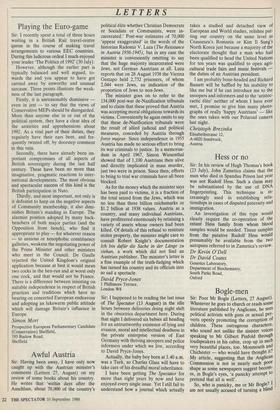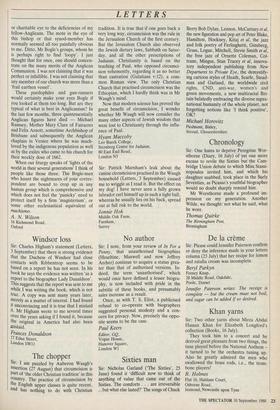Bogle-men
Sir: Poor Mr Bogle (Letters, 27 August). Whenever he goes to church or reads some literature published by Anglicans, he sees political activists with guns or sexual per- verts openly promoting the corruption of children. These outrageous characters, who sound not unlike the sinister voices speaking to Mr Gilbert Pinfold through loudspeakers in his cabin, crop up in such very beautiful places, too. Monmouth and Chichester — who would have thought it? My article, suggesting that the Anglican Communion is not in nearly such poor shape as some newspapers suggest becom- es, in Bogle's eyes, 'a panicky attempt to pretend that all is well'. So, who is panicky, me or Mr Bogle? am not usually accused of turning a blind
LETTERS
or charitable eye to the deficiencies of my fellow-Anglicans. The mote in the eye of this bishop or that synod-member has normally seemed all too painfully obvious to me. Ditto, Mr Bogle's groups, whom he is perhaps right to find 'loopy'. I just thought that for once, one should concen- trate on the many merits of the Anglican Communion. I was not claiming that it was perfect or infallible. I was not claiming that any member of our church was more than a `frail earthen vessel'.
These paedophiles and gun-runners would certainly make your eyes Bogle if you looked at them too long. But are they typical of what is best in Anglicanism? In the last few months, three quintessentially Anglican figures have died — Michael Ramsey, Mother Mary Clare of Fairacres and Felix Arnott, sometime Archbishop of Brisbane and subsequently the Anglican chaplain in Venice where he was much- loved by the indigenous population as well as by the exiles who came to his church for their weekly dose of 1662.
When our liturgy speaks of 'lights of the world in their several generations' I think of people like those three. The Bogle-men who haunt the nightmares of your corres- pondent are bound to crop up in any human group which is comprehensive and which does not feel the 'panicky' need to protect itself by a firm `magisterium', or some other ecclesiastical equivalent of machismo.
A. N. Wilson
16 Richmond Road, Oxford























































 Previous page
Previous page